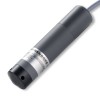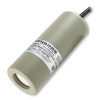Chemical resistant submersible sensors and instruments are engineered for continuous operation in aggressive media such as acids, alkalis, and solvents. These devices, including level, pressure, and temperature sensors, are critical for process monitoring and control in industries ranging from chemical processing and wastewater treatment to pharmaceuticals and food production. Specialized materials and construction techniques ensure reliable performance and extended service life in demanding environments.
 Sulfuric acid 12-15% conc. drop-in level probe for 10m high tank - level measurement of sulfuric acid tanks with a concentration between 12 and 15%.
Sulfuric acid 12-15% conc. drop-in level probe for 10m high tank - level measurement of sulfuric acid tanks with a concentration between 12 and 15%. Ferric Chloride solution hydrostatic level transmitter - We're looking for a hydrostatic level transmitter which is resistant to acids & chemicals including Chlorine & ferric chloride acid (FeCl3) dissolved in water
Ferric Chloride solution hydrostatic level transmitter - We're looking for a hydrostatic level transmitter which is resistant to acids & chemicals including Chlorine & ferric chloride acid (FeCl3) dissolved in water
 LMK809 Plastic Submersible Low Level Transmitter
LMK809 Plastic Submersible Low Level Transmitter LMK807 Plastic Submersible Level Transmitter
LMK807 Plastic Submersible Level Transmitter LMK 806 Plastic 21mm diameter Submersible Level Probe
LMK 806 Plastic 21mm diameter Submersible Level Probe LMK 858 Plastic Submersible Liquid Level Sensor with Removable Cable
LMK 858 Plastic Submersible Liquid Level Sensor with Removable Cable
- Raw leachate feed tank depth probe - Depth probe for monitoring the level of raw leachate in feed tanks up to 1 metre high on a landfill site.
- 2m range 0.6% conc. chlorine liquid level sensor - Corrosion resistant liquid level sensor to measure up to 2m chlorine solution 0.6% conc.
- Hydrochloric acid storage tank 1mH2Og hydro-static pressure transmitter - A hydro-static pressure transmitter for storage tank level monitoring use to measure level of 36% hydrochloric acid over a range of 0 to 1 mH2O g by immersion in the tank, and sending the corresponding 4-20mA signal through the submersible electrical connection.
- Chemical resistant level sensor for sodium hydroxide and bleach - Plastic-bodied submersible transmitter with a flush ceramic sensor provides reliable level measurement in a disinfection tank containing high-density, aggressive media.
- 33% HCL level monitoring with PVDF submersible probe - Highly corrosion-resistant submersible hydrostatic level sensor for bulk acid storage tanks.
- HVO and FAME biofuel storage tank submersible level sensor - Explore a solution for reliably measuring the level of biodiesel fuels such as HVO and FAME. A submersible level transmitter was specified with carefully selected wetted parts, including an FEP cable and FKM seals, to ensure long-term chemical compatibility in alternative fuel storage tanks.
 Plastic Submersible Hydrostatic Liquid Level Sensors - Explore our selection of corrosion-resistant submersible hydrostatic level sensors specifically designed for challenging chemical applications
Plastic Submersible Hydrostatic Liquid Level Sensors - Explore our selection of corrosion-resistant submersible hydrostatic level sensors specifically designed for challenging chemical applications
Find out more about Chemical Resistant Submersible Sensor and Instrument Probes to determine which product options and capabilities will best meet your application requirements.
Ensuring Reliability in Harsh Chemical Environments
The ability to withstand corrosive chemicals is paramount for submersible sensors and instruments. Direct contact with aggressive media necessitates careful selection of materials and design considerations to maintain measurement accuracy and prolong operational life.
- Materials for Chemical Compatibility: Sensor housings and wetted components utilize materials specifically chosen for their resistance to specific chemicals:
- PVDF (Polyvinylidene fluoride): A robust fluoropolymer offering broad chemical resistance, particularly to acids, bases, and solvents.
- PTFE (Polytetrafluoroethylene): Renowned for its exceptional inertness and ability to withstand high temperatures, making it suitable for extreme conditions.
- Titanium: A strong, lightweight metal with inherent corrosion resistance and biocompatibility, often used in demanding applications.
- Hastelloy: A family of nickel-based alloys specifically formulated to resist highly corrosive oxidizing and reducing acids.
- PVC (Polyvinyl chloride): A cost-effective material with good resistance to many acids, bases, and salts.
- PP (Polypropylene): Offers excellent chemical resistance and is particularly suitable for applications involving oxidizing agents.
- Ingress Protection and Sealing: Preventing the penetration of corrosive media is crucial for protecting sensitive electronics. Various sealing methods are employed:
- O-ring Seals: Provide a reliable barrier against liquids and gases.
- Potting Compounds: Encapsulate electronics in a protective resin, preventing contact with corrosive substances.
- Hermetic Sealing: Creates a completely airtight and watertight seal, ensuring long-term protection in submerged applications.
- Cable Considerations: The cable connecting the submersible probe to the measurement system must also be chemically resistant. Common cable jacketing materials include:
- PTFE, FEP, and PFA: Fluoropolymers that offer excellent chemical resistance and flexibility.
- PVC: Provides good chemical resistance and cost-effectiveness for many applications.
Industrial Applications
Chemical resistant submersible sensors and instruments are essential in a variety of industries:
- Chemical Processing: Monitoring and controlling critical parameters like level, pressure, and temperature in reactors, storage tanks, and pipelines.
- Wastewater Treatment: Measuring the pressure of aggressive fluids in pipelines and pumps, providing critical data for process optimization.
- Pharmaceutical Production: Maintaining precise control over critical parameters during drug manufacturing processes.
- Food and Beverage Industry: Monitoring hygiene and quality parameters, particularly in Clean-in-Place (CIP) systems.
- Environmental Monitoring: Assessing water quality in groundwater, surface water, and industrial effluents.
